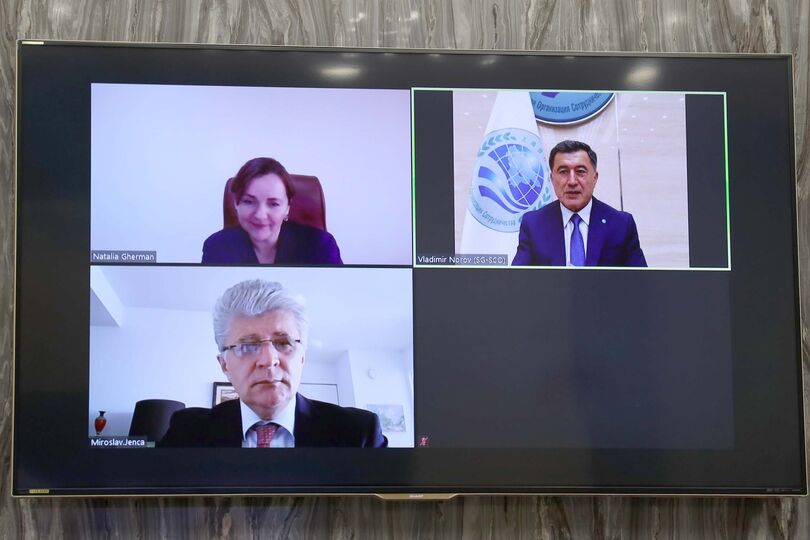On 8 June 2020, at the initiative of the United Nations Secretariat in New York, SCO Secretary-General Vladimir Norov participated in a video conference with UN Assistant Secretary-General Miroslav Jenca and Natalia Gherman, Special Representative of the UN Secretary-General for Central Asia and Head of the UN Regional Centre for Preventive Diplomacy for Central Asia (UNRCCA).
The parties exchanged opinions on the progress in countering the coronavirus epidemic in the region, preparations for the upcoming SCO summit, the current situation in Afghanistan and prospects for further cooperation between the SCO and UN institutions.
Vladimir Norov informed his counterparts about the measures that have been taken by SCO members to combat the COVID-19 pandemic. "The ad-hoc mechanisms of multilateral cooperation within the SCO proved to be in great demand. On 1 April 2020, medical experts held a video conference and agreed to draft a compilation document in which they would share their advanced expertise on how to contain the infection. SCO healthcare ministers are planning a meeting in early July."
"SCO member states have demonstrated a high level of solidarity through extensive mutual support. Supplies of pharmaceuticals and medication to the countries in the region that are in great need indicate the friendly nature of the relations within the Organisation and the shared wish to overcome this emergency together," the SCO Secretary-General noted.
Vladimir Norov noted that on 13 May 2020, during an extraordinary meeting, SCO foreign ministers adopted a joint declaration concerning the spread of the coronavirus infection that reflected common approaches to the problem based on the principles of global solidarity and inclusivity, and maintaining the UN's central role and effective cooperation with the WHO.
The Secretary-General reported on preparations for the SCO summit in St Petersburg that had been postponed until autumn.
As the discussion moved on to the situation in Afghanistan, the parties emphasised that the intra-Afghan crisis could only be resolved through political dialogue and an inclusive peace process led and overseen by the Afghans themselves. The parties noted the SCO-Afghanistan Contact Group's contribution towards the restoration of peace, security and stability in the country.
Vladimir Norov stated that the SCO prioritises the strengthening of multidimensional links with UN institutions in accordance with the 73rd UN General Assembly's resolution on cooperation between the two organisations.
He noted positive trends in cooperation between the permanent bodies of the SCO, the United Nations Office on Drugs and Crime and the UN Office of Counter-Terrorism, and supported further expansion of this cooperation in extended formats involving other regional organisations.
Vladimir Norov said that as of today, the SCO Secretariat has signed seven memorandums of understanding with the United Nations and its specialised bodies. Other documents in development include memorandums with the WHO, UNCTAD, UNECE and ESCAP. The Organisation is also exploring the possibility of establishing dialogue with such UN institutions as UNIDO, UNEP, UNICEF and UN Women.
UN Assistant Secretary-General Miroslav Jenca stressed that the SCO is an important partner for the United Nations in its fight against new threats and challenges. He pointed out that the Organisation's influence and areas of interest reach far beyond one region, and praised the SCO members' mutual support in countering the COVID-19 pandemic.
He spoke about preparations for the 75th UN General Assembly and the work on the agenda in the context of new global challenges and the demand for stepping up cooperation with regional organisations. He noted in particular the SCO members' support for recent initiatives by UN Secretary-General Antonio Guterres who proposed a global ceasefire, providing universal access to coronavirus medication and vaccines, and ensuring food security.
Miroslav Jenca praised the dynamic cooperation between the United Nations and the SCO and pointed out that the legal framework of this cooperation was solid and growing ever stronger.
He also suggested that the SCO Development Strategy until 2025 and the UN Secretary-General's ideas and initiatives on overcoming the consequences of the pandemic were setting important benchmarks in cooperation between the two organisations.
Special Representative of the UN Secretary-General Natalia Gherman emphasised that the countries in the region had responded promptly to Secretary-General Guterres's initiatives and demonstrated readiness for joint action.
She also noted their proactive efforts in line with adopted national emergency response plans, including within the framework of cooperation with the SCO.
Natalia Gherman praised the SCO's activity in Central Asia — in particular, with respect to preventing the coronavirus outbreak, establishing multilateral cooperation on Afghanistan, socioeconomic development and youth policy.
"Leaders of the SCO countries deeply understand the important role and significance of young people in the modern world, which has been reflected in certain documents at the highest level," she said.
The Special Representative of the UN Secretary-General noted that the multi-faceted cooperation between Central Asian states deserved the highest praise. Specifically, the countries were coordinating their activity with regard to security and countering challenges and threats, including terrorism, extremism and cybersecurity, she said.
Natalia Gherman stressed that the countries in the region were working hard to implement their national emergency response plans, cooperating closely with each other, offering various kinds of mutual support and cooperating with international bodies such as the SCO, the CIS, the CSTO, the OSCE and the EU.
She informed her counterparts about preparations for a Central Asia youth forum scheduled for late 2020 in Kyrgyzstan and the regional seminar of Central Asian countries involving representatives of youth organisations.
The parties agreed to continue their contacts.
